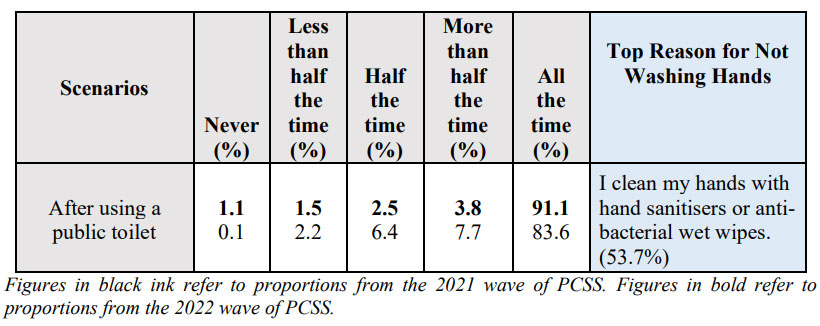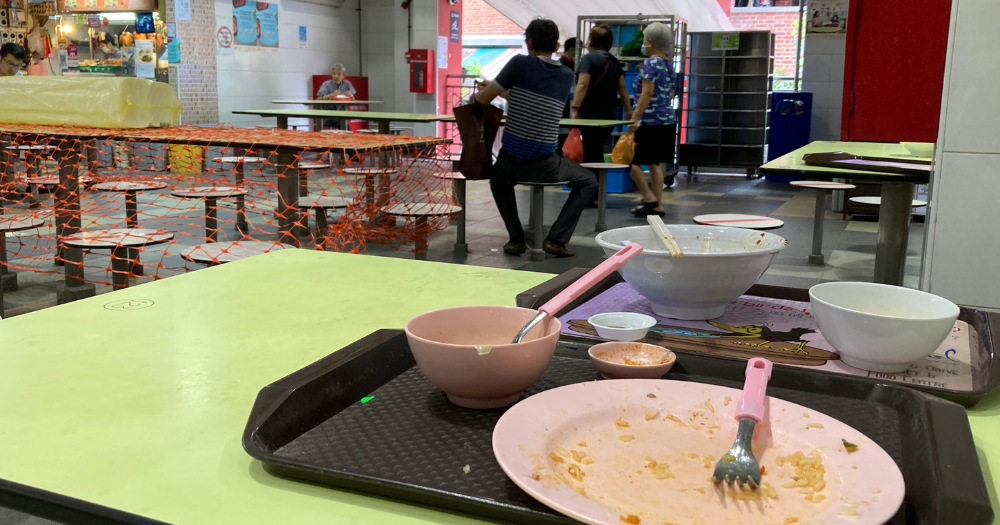Follow us on Telegram for the latest updates: https://t.me/mothershipsg
A new survey conducted with Singapore residents found that 95 per cent of respondents would return their trays and crockery all the time -- a 46 per cent increase from 2021.
Interestingly, 78.4 per cent of the respondents who claimed they clear their own trays and crockery also claimed that they did so because it was the socially responsible thing to do, and not because they were trying to avoid being fined.

These findings were derived after the Singapore Management University conducted its Public Cleanliness Satisfaction Survey (PCSS) with 2,020 Singapore residents from July to October 2022, amidst the Covid-19 pandemic.
What survey found
Tray return
The study examined public opinion about personal responsibility for public cleanliness.
Questions were asked regarding tray return practices at various food outlets, handwashing behaviour, and the maintenance of cleanliness in neighbourhoods.
On average, 95 per cent of respondents would return their trays and crockery all the time, a 46 per cent increase from 2021.
A fine was introduced from Sep. 1, 2021, for those who did not clear their trays.
Of the various food establishments, tray and crockery return rates in schools and staff canteens were the lowest at 93 per cent.
These were largely attributed to cleaners clearing respondents’ trays before they had left the table.
Some 93 per cent of respondents were supportive of the new tray and crockery return requirement, including enforcement against table littering introduced in 2021, with 97 per cent being aware of it overall.
In addition, 84 per cent of respondents felt that individual diners using the tables were primarily responsible for tray return, as compared to 58 per cent in 2021.
Public cleanliness
The survey continued to reflect an overall satisfaction with public cleanliness in Singapore.
Some 92 per cent of survey respondents were satisfied with the cleanliness of public spaces that they had recently visited, similar to 2021.
Satisfaction with the cleanliness of food outlets saw the largest decrease by 2.1 per cent to 82.7 per cent among all location types.
Nevertheless, it is still significantly higher than that in 2018 (71.4 per cent) and 2017 (68.9 per cent).
Public toilets
Regarding the cleanliness of public toilets in various establishments, 81 per cent of respondents were satisfied -- a 1 per cent decrease from 2021.
Coffeeshops were also identified to have attained the lowest satisfaction, with 53 per cent of respondents indicating that they were satisfied -- a further decrease from 61 per cent in 2021.
The satisfaction with the cleanliness of public toilets in hawker centres decreased from 68 per cent in 2021 to 63 per cent in 2022.
Of all the establishment types, public toilets in shopping malls in downtown and central business district areas yielded
the highest satisfaction rates from respondents at 98 per cent.
Handwashing habits
Handwashing seems to be a prevalent practice for Singaporeans after they have used the public toilet or when their hands are visibly dirty, with 69 per cent of respondents washing their hands all the time, compared to 56 per cent in 2021.
In cases where respondents do not wash their hands, most cited alternatives to maintaining hygiene, such as using hand sanitisers or anti-bacterial wet wipes.

Cleanliness of shared environment
Majority of survey respondents agreed that residents should take responsibility for the cleanliness of their shared environment, with 76 per cent of respondents stating that they had disposed of all litter properly in the past four weeks.
Some 95 per cent of respondents agreed that residents should bring their litter to another disposal area rather than add to the full bins.
Respondents also stated personal responsibility for the environment as a top reason for why they would dispose of trash properly, and there being no bin or disposal area nearby as a top reason for why they would not dispose of trash properly.
Reliance on cleaning services
On the other hand, despite 99 per cent of respondents agreeing that residents should be encouraged to be involved in the upkeep of their environment, only 66 per cent indicated a willingness to actually do so, which is an increase from 55 per cent in 2021.
The results also indicated that reliance on cleaning services remains high, with 90 per cent of respondents acknowledging that Singapore is clean only because of the efficiency of its cleaning services.
Nevertheless, 99 per cent of respondents agreed that residents must work together with cleaners to keep the neighbourhood clean.
Responsibility of keeping Singapore clean
Lastly, 77 per cent of respondents believe that it is the government’s responsibility to keep Singapore clean, an increase from 73 per cent in 2021.
Some 81 per cent of respondents are supportive of pausing public cleaning for one day, and 84 per cent support the implementation of a litter-picking exercise in their housing estate, though 56 per cent would not participate in such an initiative.
Top photo Jane Zhang
If you like what you read, follow us on Facebook, Instagram, Twitter and Telegram to get the latest updates.
